#THE STORY IS LITERALLY JUST DRAGON BALL IF IT WAS BORING AND HAD AN OVERPOWERED MAIN CHARACTER FROM THE BEGINNING????
Text

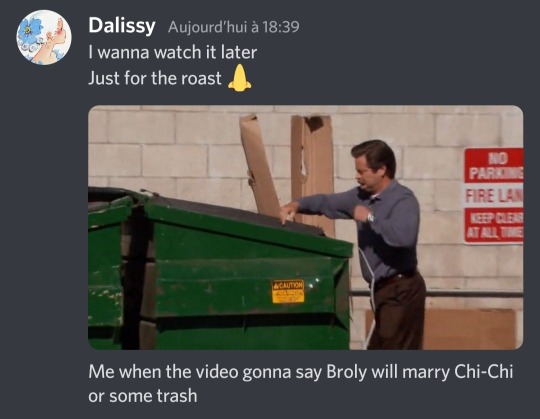
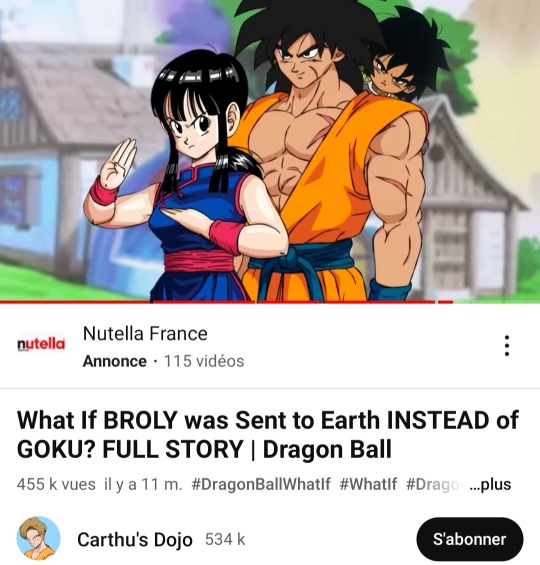
✨I hate being right✨

#dragon ball#im posting this cause I wanna rant in the tags actually#like. 💀💀💀💀 WHY ARE THESE VIDEOS SO POPULAR#IT'S LITERALLY AN UGLY POWERPOINT WITH A SHITTY STORY?#AND PEOPLE SAYING THEY LOVE THIS IN THE COMMENT?#HOW AND WHY#and like. this dude sounds nice or whatever but when I say it's shitty IT REALLY IS#THE STORY IS LITERALLY JUST DRAGON BALL IF IT WAS BORING AND HAD AN OVERPOWERED MAIN CHARACTER FROM THE BEGINNING????#i am flaggerbasted#no imagination NOTHING#And he asked at least 238473829283 times for you to suscribe I'm—#i can't 💀💀💀💀#bruh#shitpost#dalissy babbles#dbz#db
149 notes
·
View notes
Photo
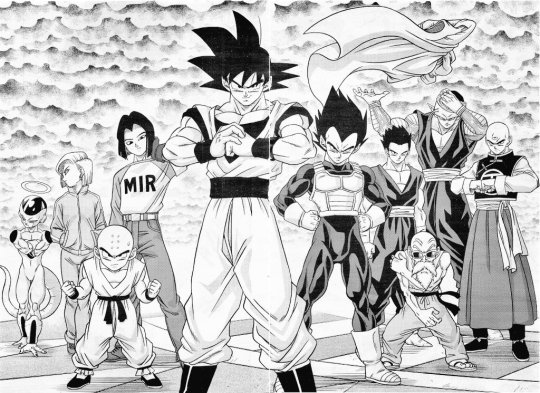
Dragon Ball Super and the Future
by Bunnypwn Gold
I am a huge fan of Dragon Ball, as I have stated here before and as I have written about in the past. My love and knowledge of this franchise is deep, and I will always be ready to enjoy what it has in store and wrestle with the ideas in it. And right now, it’s a great time to be a fan, because Dragon Ball Super is going strong. The anime has come to a conclusion and/or could come back in the future, and the manga is approaching the climax of its newest story, the Galactic Patrol Prisoner Saga. It’s amazing for a lot of reasons that I’ll discuss as I respond to this article by Kofi Outlaw, which praises the saga for going back to DBZ style storytelling as a “course correction.” While I agree with several points in this article, I also disagree with the basic premise and argue that the author is only saying these things about the saga because he has not been paying attention to how consistently better the manga has been than the anime of Super. I am using this response to organize my thoughts on how Super has gone so far, the divide between the anime and manga version of events, and the future of the series as a whole, not as a pro or anti stance against Kofi or his article, to be clear.
At the beginning, Kofi criticizes Super for having low stakes and focusing on making Goku and Vegeta the sole focus, increasing their power levels dramatically and leaving other characters to languish. He also said that there were a lot of gimmick fights. Overall, the story structure had changed to reflect this change in character focus and the villains were weak and unmemorable. This new arc, featuring fan-favorite villain Planet-Eater Moro and a range of great battles with his bandits for the Z Fighters to show their stuff, is a return to the DBZ structure, and it features all the brutality and high stakes of the old days. Best of all, it lays the foundations for a new future focusing on other characters.
I have to say, I agree with much of this. The focus on Goku and Vegeta as “Gods” and their super-special Saiyan-ness in the meta canon is really annoying to me. Elements of this were seen in DBZ, as the humans and Piccolo stop trying to catch up to the Saiyans, and it was all GT was about, making that series a big disappointment for me. The first three stories of the Super era are notably low stakes, as well, and I would have liked a little more tension. There could have been more focus on other characters and a larger cast in general, and that certainly would have been enjoyable. And to finish it out, I am very excited for what the Moro story means for the future. The whole thing has a “last chance to shine” feel for the old guard of characters we’ve known and loved for years, Goku is probably going to master Ultra Instinct and thus complete his journey as a martial artist, and it still opens up a lot more about the history and lore of the series to explore in the future.
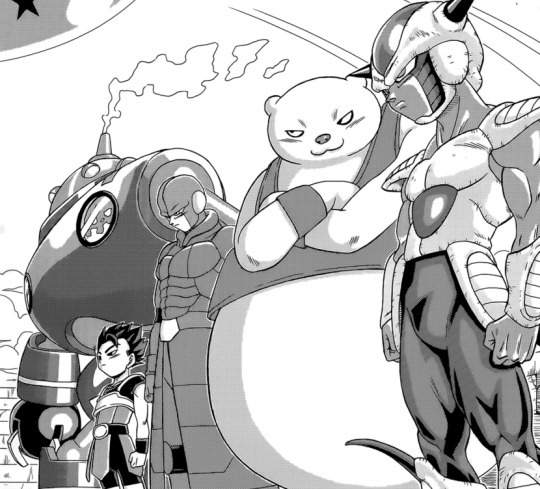
Beyond that, I have a lot to disagree with. For starters, if you look at the Tournament of Destroyers and the Tournament of Power and just see a bunch of “gimmicky fights” and no stakes, you’re missing the point. I always loved the tournament stories in Dragon Ball, and both of these Super tournaments deliver on that joy. The manga had a lot of important differences with the anime in how these tournaments went, too. Before the Tournament of Destroyers, the manga went through a condensed version of the Battle of Gods events, only offering one extension in the opening to give an actual benchmark on Goku’s strength so we know where we’re starting as a series, an important gift the anime and movie fail to deliver. It then time skips past the Resurrection ‘F’ story, which I think is sad, but ultimately serves the manga’s purposes. After Goku got his God form, the next thing we see, before the Tournament, is Goku training with a new master, showing that he’s back on the path to martial arts excellence. By skipping the Golden Frieza fight, the manga passed on a story that only shows off how cool Super Saiyan Blue looks (a term, by the way, the manga invented because it’s better); outside of showing off this new form, the Golden Frieza story adds nothing. As Goku and Vegeta enter the Tournament of Destroyers, they build a team entirely focused on power, and lose one of their strongest members because of a test of intelligence. To further drive home the point, Goku’s final battle with Hit ends with him realizing that his strength allows him to outmaneuver an innovative and amazing fighting technique, Time Skip. He then forfeits the match so he can have a real fight with Hit later, where Hit can try to kill Goku and has time to train beforehand, which sounds a lot like a DBZ style story. It’s the first step in Goku relearning that technique matters more than power. In the manga, they also gave more love to Piccolo. In the anime, they had him be effectively useless, barely able to fight Frost, a Frieza parallel. The manga had Piccolo fight evenly with Frost, who later shows that he’s almost an equal with Super Saiyan Goku; Piccolo lost because of poison, not because he “could never hope to beat a strong person.” It’s not as cool as it could have been, but it’s more than Piccolo ever got in the anime.
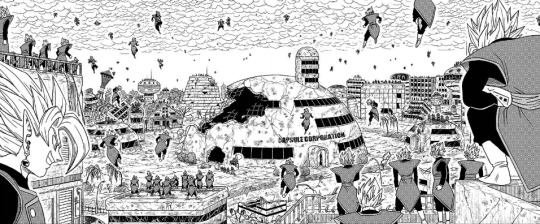
Now, I have to vehemently disagree that Zamasu was a weak, forgettable villain who existed solely as a gimmick. The Zamasu story carefully builds and delivers on the many themes of the franchise that I identify as atheist. Throughout the series, Toriyama repeatedly introduced gods of varying kinds and levels of divinity for the sole purpose of tearing down the illusion of their importance and special qualities. Gods in this world are a verifiable fact, and not only are they just people with a particular job, but every time Goku and Vegeta meet a god, they treat them like anyone else and show them no special respect or deference. Goku and Vegeta are the best exemplars in the series of treating deities like normal people, something the series itself does regularly. It’s one of my favorite parts of the series, as an atheist myself.
So, here we have Zamasu, a deity who believes that he’s uniquely capable and qualified to rule all of existence and that mortals aren’t worthy of life. In the Bible, on more than one occasion, God decided to wash the world clean of humans because they had become too sinful; similar stories exist in other religions and cultures. In this case, Zamasu is motivated by intense and literal hatred of mortals, who he sees as not simply having “become too sinful,” but fundamentally incapable of being anything else. He extends this hatred to other gods who want mortals to exist and do as they please. His rise in Future Trunks’s time to be the almost-almighty God with a Capital G is the antithesis of what the series has said about gods and divinity on every level, and that’s exactly why he’s such an amazing villain. He also checks a lot of other boxes. He uses the power of a mortal who made himself into a god, Goku, to kill the gods and overpower the mortals. He also relies on a mortal, Trunks, to develop his power and another, Dabura, to create the opening he needed to start his plan. In working to bring the downfall of all mortals, Zamasu in effect worships at the altar of mortals and relies on their miracles to succeed, just as Goku has trained with several deities on his path to success.
Trunks is also notable, because growing up, Trunks didn’t have any gods to look to like Goku did. The first “god” in Trunks’s life was Goku, as both his mother and teacher would talk about Goku as their main inspiration for hope. Goku was made into a mythical figure that could have fixed everything, and that’s exactly what Trunks used time travel for, both times he employed the strategy. That’s why Zamasu taking Goku’s body was so impactful, because “hope” came to kill him. Goku’s ultimate failure to defeat Zamasu also tears down the idea of Goku’s “divinity” in the same way as other gods were taken down a notch. This results in Goku calling on Zeno for help. The development of Goku and Zeno’s relationship is interesting and important in setting up the conflict of this story. They become friends because Goku is the only person who treats Zeno like he’s not special, which seems to confirm that Goku’s relationship to divinity is proper. At the same time, Goku doesn’t like Zeno, because he knows Zeno is just a bored shut-in and likely doesn’t understand Zeno’s role. And really, Zeno doesn’t have a role like the Gods of Destruction and the Supreme Kais. He’s in charge because he’s the most powerful and can destroy all of existence with a thought. That’s exactly what Zeno decides to do when he sees Zamasu and the multiverse he had been ignoring, getting rid of everything because he didn’t like how it turned out. Not unlike Zamasu with mortals; in effect, Zeno is the thing that Zamasu wanted to become, and that story ends with his vision of reality being carried out. It was the ingenuity of mortal time travel that made some form of happy ending, because like in every other Dragon Ball story, you can’t rely on the gods for most anything. So yeah, Zamasu is an amazing villain and his saga was brilliant. My main criticism of the manga version was that the setup was rushed, so the death of Future Bulma happened off panel and the death of the rest of the mortals in existence was breezed by. Plenty of brutality and high stakes, if you ask me, though yes, I wanted to see it with my own eyes more.

Then we get into the Tournament of Power, a great tournament story that really drives home the point of the god-centric Super run. The Tournament of Power, if you didn’t guess, isn’t about power. It’s about teamwork, strategy, and skill. In the manga, this is made absolutely clear. The downfall of everyone in the tournament is that they rejected this basic premise or were wiped out by someone who would later meet their downfall for rejecting this basic premise, setting up their incorrect view to be knocked down in the end. Goku brought Frieza onto Team Universe 7 because he feared they would need his raw power, ignoring the possibility they bring in Yamcha or Chaozu for a friendly face that works well with their team. Hit reappears and shows that he has gotten way stronger. However, he loses to Jiren, Goku’s main opponent, in the opening of the tournament because he was relying on that raw power and abdicated the potential of his famed fighting technique. Multiple times, stronger and more arrogant solo fighters regard those fighting as a team as being weak and no threat. The main exception to those relying on teamwork being weak is Gohan, who was very strong and wanted to work as a team. In the anime, Gohan was made inferior to Frieza and ultimately lost trying to beat a lesser opponent. In the manga, Gohan, in his Potential Unleashed state and not as a Super Saiyan of any form, fought evenly with Hybrid Super Saiyan Kefla, who I suspect was the second strongest person on the field, and double-KO’d with her. In the fight, it’s implied that Gohan could go Super Saiyan while using his Potential Unleashed state, but chose not to so he didn’t have to rely on that kind of gimmicky power. It’s incredibly badass and satisfying.
As the fight with Jiren nears its climax, Goku uses a strategy that could kill him in an attempt to overpower the foe who’s stronger than any God of Destruction. This prompts Roshi to step in and admonish Goku with the single most important line in Super. When Goku says he needs more power to beat Jiren, Roshi says, “Hmph…Power, y’say? Plain old fighting strength? Who the heck taught you that? Vegeta? Frieza?” This is a great moment, because not only does it push Goku to go for Ultra Instinct and focus on bettering himself as a martial artist once again, but it pushes back on the worst lessons fans take from the franchise. Goku isn’t cool because of his strength, and he’s not so strong because he can transform. It’s all about that martial artist’s journey, baby. Goku grew up constantly learning new ways to become a better martial artist than he was the previous day, and it was pure passion driving him; he got to where he is because he took every opportunity to better himself, with his transformations just a convenient way for the story to keep upping the stakes. Jiren is the pursuit of raw power incarnate, with indifference and constant dissatisfaction his reward, and all he wants is his dead master to tell him he’s finally a good fighter. He’s everything Goku was becoming, and Goku overcame him by returning to his roots. He was able to fight Jiren evenly with a technique that anyone, theoretically, could learn if they reached the same heights of martial arts mastery, as proven when Roshi uses an imperfect form of Ultra Instinct to trade blows with Jiren. The manga anchors this lesson because it focused on technique the whole time and built towards this moment: Super Saiyan God was just another technique that showed Goku he had a lot left to learn; the Tournament of Destroyers showed how boring life is when you’re so strong you can’t actually test yourself; Zamasu showed how power is corrupting and how the pursuit of it changes you; and the Tournament of Power shows how damaging and literally suicidal pursuing raw power over personal growth is.
And to put the nail on the coffin, Goku doesn’t beat Jiren with Ultra Instinct, but instead beats him by briefly working with Frieza; you can’t master the path of a martial artist in one fight. Android 17 wins the tournament for their universe by playing dead, an age-old strategy, and uses the Super Dragon Balls to wish back all the universes destroyed by Zeno. While that can be seen as lowering the stakes, it’s no more stake-lowering than any other time the Dragon Balls have been used this way in high-stakes stories, and the stakes in this case were the destruction of eight entire universes. That’s pretty darn high. Also, it’s a good time to point out that Zeno was the real villain of the Tournament of Power. He was going to destroy eight universes out of boredom, and then remembered he could instead let one survive by having them Hunger Games for his amusement. There are no stakes, no reason to fight, without Zeno. There’s going to be conflict with Zeno in the future, I’m sure of it.
The anime followed a very different route than the manga, focusing entirely on Goku’s raw power and how cool he is. They added a lot of filler moments to both increase the number of gimmick fights and silly, campy fun, too, which made the whole thing lower stakes and less brutal. As described in regards to Piccolo and Gohan, the anime also made other characters weaker compared to Goku and Vegeta to amplify the impact of their unique transformations. In the Tournament of Destroyers, the anime introduced the idea of Goku using Kaio-ken while Super Saiyan Blue, for no other reason than to let Goku use a bunch more strength after he proved he could win. I won’t get into it, because it’s a tangent, but the entire concept of Blue Kaio-ken is BS, and the DBZ anime is where the proof lies; the Super manga actually touches on that exact thing, since Goku trying something like Blue Kaio-ken against Jiren is what nearly kills him and prompts Roshi to step in. Anyway, the anime also elongated the Zamasu story with a series of gimmick fights meant to show off how cool the three Saiyans were, even though they knew from the start that none of them would beat Zamasu. That story featured a bunch of secretly alive people, too, lowering the stakes and overall brutality of Zamasu as a villain. The time between Zamasu and the Tournament of Power, including the lead-up to the tournament, was spent showcasing filler side stories that make the other characters, ignored for most of Super, look way cooler and stronger than they actually ended up being. For as much as I wanted to see more from Krillin, Tien, and Piccolo in the manga, at least Toyotaro didn’t jerk us around acting like they were going to be way bigger players than they were. And the way the anime presented Goku achieving Ultra Instinct was focused entirely on strength and treating it like a super cool new transformation, which it isn’t. So if you were watching that story, I could see how you come out of Super thinking that it’s less intense, more gimmicky, and glorified one or two characters to the detriment of others. That’s why I think you could only be as impressed with the Moro arc as a “course correction” if you’ve been paying attention to the anime and only just now got into the manga.
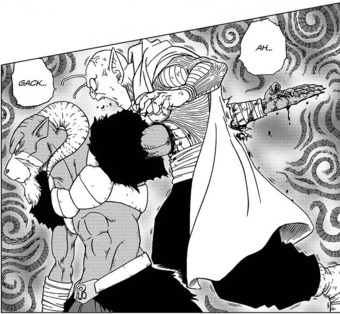
This brings and end to what I’ll call Phase 1 of Super and to a time skip past the battle with Broly (which I would argue was for the same reason the Golden Frieza battle was) and into the Moro arc, which I agree is a great story that brings back a lot of things Super wasn’t doing enough of. It even brings back the meta story structure of the Buu Saga, since the first part is a very Phase 1 storyline and the second half, after Goku and Vegeta are defeated, is much more of a DBZ storyline, just as Kofi described. It’s like saying, “Yeah, we want to pivot away from this, we’re done making that point.” Looking at the first part of the Moro arc, you can read it as a way of reinforcing the grand statement of Phase 1, that the constant jockeying for power and strength and the glorifying of a couple people to the detriment of others is a bad way to write a story. The reason that’s important to say is because that’s the way a lot of the meta canon has been going for a while, at least it seems to me; all the fun, original video game stories are about Saiyans and their super special Saiyan-ness and how super cool strong they can get. It’s why GT was such a disappointment to me, and as I said, it stopped several great characters from trying to become better during DBZ. I think Kofi is right to say moving away from that model of storytelling is a good and important shift in the right direction, though I can’t say if it’s for the same reasons. That’s because, if it’s not clear, I think that what Super did along the way in Phase 1, at least in the manga, was better, more important, and more complex than the simple glorification and valorization of Goku and Vegeta, loaded as it was with themes arguing against that model and continual demonstrations of why they need to switch back to a focus on their martial arts journey. The structure of the Moro arc only serves to reinforce and finalize this thematic argument. As it continues, we are undoubtedly in store for some truly amazing fights and a satisfying, climactic battle with Moro for the entire Dragon Gang.
I also want to make a very important point for how the series is moving forward. Kofi says that Toriyama is switching back to this DBZ style story because he “has learned a thing or two from his mistakes.” For one, the massive success of Super doesn’t really seem like a mistake for anyone to learn from. For two, it’s really in poor taste to imply that Toriyama is changing how he’s writing a story because of negative fan reaction. Allegedly, that sort of thing happened with the Buu Saga, which is why Goku came back and we saw Super Saiyan 3, the perfect continuation and parody of the Super Saiyan form, all because the fans didn’t like Gohan’s high school adventures. I don’t think that’s happening again, allegedly, and in my opinion it’s not exactly a good look to say that it is. For three, that almost literally can’t be what’s happening, because Toyotaro has much greater control over the narrative by now. For those who don’t know, the way Super is being created is that Akira Toriyama writes plot summaries, and then lets the different creatives develop it from there, free to add and subtract and move around what they will. The anime team decided to focus on power and how super cool Goku is, and that version of events reflects that. Toyotaro, artist and co-author of the manga, kept his eye on the martial arts journey while executing this long vision of Toriyama’s to introduce new levels of grandeur and warn against getting lost in it, and that version of events reflects that. Over the course of the series, each creative team was given increasingly greater control over the narrative, leading to greater divergences; the two Tournaments of Power might as well be two different stories. By now, in the Moro arc, with no competing anime version of the story, Toyotaro has much more authorial control than when he started, and that will only increase until, as I hope and predict, Toriyama officially hands off the series to Toyotaro’s capable hands so he can write new stories for the foreseeable future. So no, I don’t think it’s very accurate to say that Toriyama learned any lesson because Toyotaro is the one making the important changes in how the story is told, not Toriyama. Keep your eye on the prize, you know; forgetting Toyotaro’s role means forgetting that we can and probably will have new Dragon Ball that isn’t a video game or video game-related story after the passing of Toriyama. I think the long hiatus of the anime reinforces this: Toriyama has said that if the anime team followed Toyotaro’s lead, they wouldn’t make so many art mistakes, and allowing the manga to develop lead time could be a strategy to follow the manga as a source material in the future, rather than continue this confusing dual path.
So yeah, the Dragon Ball Super manga is better than the anime in every way, and judging the series by the anime alone is setting yourself up for disappointment. The Galactic Patrol Prisoner Saga showcases an amazing villain for the franchise, and it sets up more to explore in a future that values the contributions of the full cast. It also, to my eyes, foreshadows the end of the road for the Dragon Gang we’ve been following so far, and thus a potential new beginning with their successors; I mean, there’s no more time after this between Beerus and meeting Uub to use, and meeting Uub is the moment Goku passes the baton to a successor. This is a time to look forward to that bright future and reflect on the themes the manga has been developing as we head into it, as well as what the two versions of Super mean for the franchise as a whole.
#dragon ball#dragon ball super#Dragon Ball Z#goku#tournament of power#universe 6#zamasu#goku black#jiren#vegeta#moro#Akira Toriyama#toyotaro#manga#anime#comics#comic books
22 notes
·
View notes